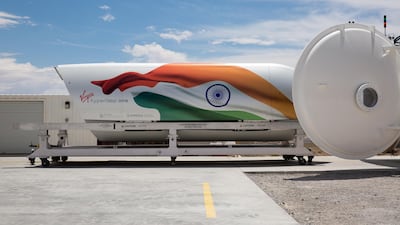The Hyperloop consortium backed by Dubai ports operator DP World has gained support from a state government in India to advance its technology.
The Government of Maharashtra deemed hyperloop as a public infrastructure project, setting it up to potentially become the first hyperloop system in the world. The state had already approved the Virgin Hyperloop One-DP World consortium as Original Project Proponent (OPP) for the scheme, meaning it has successfully submitted an unsolicited proposal for the project.
Virgin Hyperloop One is a futuristic transportation company that plans to use magnetic levitation to revolutionise travel. Hyperloop technology relies on depressurised tubes carrying passengers or cargo in pods at speeds of up to 1,080 kilometres per hour, nearly three times faster than conventional high-speed rail.
Making hyperloop a public infrastructure project is a "landmark announcement", which recognises hyperloop technology alongside traditional forms of mass transit, the consortium said in a statement. It paves the way for a proposed 150km-long hyperloop system between the cities of Pune and Mumbai, which could cut a journey that currently takes more than three and-a-half hours by road down to just 35 minutes.
“Support for hyperloop transportation systems is mounting across the world and India has led the charge to bring hyperloop to fruition since the early stages of development,” said Sultan Ahmed bin Sulayem, the chairman and chief executive of DP World and chairman of Virgin Hyperloop One. “To be named OPP is an incredible vote of confidence in our ability to deliver this advanced technology to the people of India and enhance their lives.”
Devendra Fadnavis, chief minister of Maharashtra, vowed the state would "create the first hyperloop transportation system in the world and a global hyperloop supply chain starting from Pune".
"Maharashtra and India is at the forefront of hyperloop infrastructure building now and this is a moment of pride for our people," he added.
DP World is set to invest $500 million (Dh1.8 billion) in private capital to fund the first phase of the project, which involves certifying hyperloop technology for passenger use. The consortium argued that the project could help to generate over $36 billion in wider socio-economic benefits.
There are currently 75 million passengers travelling between Mumbai and Pune each year, but this number is expected to grow to 130 million by 2026. The consortium said that its ultra-fast hyperloop transport system could carry up to 200 million passengers per year.
The consortium is in a race to be the first operator of a passenger-carrying hyperloop system with competitor Hyperloop Transportation Technologies (Hyperloop TT).
Hyperloop TT had signed a preliminary agreement with the government in the Indian state of Andhra Pradesh in September 2017 to bring forward a proposed Public-Private Partnership scheme linking the cities of Vijayawada and Amaravati, with a view to cutting a journey that currently takes an hour down to six minutes.
“The dynamism shown by the State and Federal governments and public agencies in India has been visionary, and the country will reap the benefits of being a first-mover in adopting hyperloop technology,” said Harj Dhaliwal, managing director of India and Middle East for the Virgin Hyperloop One-DP World consortium.
In July, Virgin Hyperloop One said it will undertake a study with Saudi Arabia's Economic City Authority to develop the world's longest test track.
The study will include development of a 35-km test and certification track; look into opportunities to develop local expertise; as well as commercialise and scale the technology in Saudi Arabia. Development of localised hyperloop supply chains and setting up more innovation clusters across the kingdom will be part of the study, which is focused on the King Abdullah Economic City, located 100km north of Jeddah.


